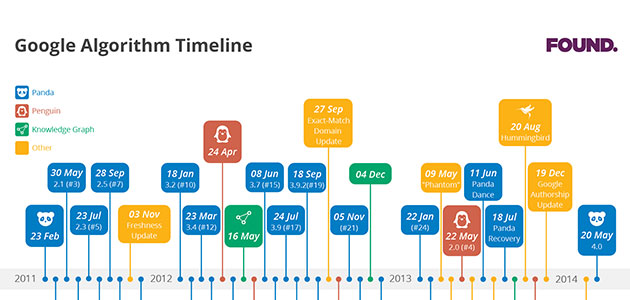Understanding the Implications of Google's Algorithm Updates on SEO Methods and Positions
In the ever-evolving landscape of seo (SEARCH ENGINE OPTIMIZATION), the effects of Google's algorithm updates have become a centerpiece for businesses and marketers aiming to keep or boost their online exposure (Google’s Algorithm Updates). As Google continues to refine its algorithms to provide users with one of the most pertinent and top quality search engine result, recognizing exactly how these updates effect SEO strategies and positions is critical. From the subtle changes in keyword approaches to the extra obvious emphasis on user experience, the interaction in between algorithm updates and SEO techniques introduces a complicated web of factors to consider that require continuous vigilance and flexibility
Development of Google's Algorithm

The Panda update, released in 2011, targeted low-quality web content and penalized websites with replicate, slim, or unnecessary material. Penguin, launched a year later, resolved link spam by devaluing manipulative web links. Hummingbird, introduced in 2013, noted a shift towards semantic search, recognizing the context and intent behind individual questions rather than simply matching key phrases.
These updates forced site proprietors and SEO experts to prioritize individual experience, top quality content, and natural web link structure strategies to enhance their positions in Google's search results page. The evolution of Google's formula emphasizes the search engine's commitment to providing relevant and useful material to customers while punishing tactics aimed only at gaming the system.
Influence On Keyword Technique
With the development of Google's algorithm towards prioritizing individual experience and material importance, the Effect on Key phrase Strategy has become increasingly important for web site proprietors and search engine optimization experts seeking to line up with these online search engine updates. Search phrases are no more nearly matching search terms but understanding user intent and delivering beneficial web content. Google's updates, such as BERT and RankBrain, concentrate on natural language processing and context, making keyword technique much more advanced.

In Addition, with Google's focus on semantic search and user-focused content, key phrase padding is no more effective and can even hurt positions. Rather, incorporating keyword phrases normally right into top quality, appropriate web content is key. By comprehending the effect of Google's formula updates on keyword strategy, site owners can improve their search engine optimization efforts and enhance their exposure in search engine result.
Modifications in Web Content Optimization
As the landscape of search engine optimization remains to develop, web site proprietors and search engine optimization check out this site experts are experiencing substantial changes in material optimization methods. In the wake of Google's algorithm updates, there has been a growing focus on developing high-grade, pertinent, and reliable web content that supplies value to customers. This suggests that just stuffing key phrases right into short articles is no more effective; rather, material should be well-written, engaging, and customized to fulfill the requirements of the target audience.
Moreover, there is a higher emphasis on customer experience and complete satisfaction, with search engines fulfilling sites that use a seamless browsing experience and useful details. As a result, material optimization currently entails not just incorporating appropriate search phrases naturally but likewise structuring material in a means that is very easy to check out and browse.
Importance of Individual Experience
Enhancing individual experience on an internet site is paramount in modern SEO methods, offering as a crucial consider establishing a website's presence and success in internet search engine positions. Customer experience incorporates numerous elements such as website rate, mobile-friendliness, instinctive navigating, and engaging web content (Google’s Algorithm Updates). Google's algorithms increasingly prioritize sites that use a satisfying and smooth customer experience, as it directly correlates with individual contentment and retention
A favorable individual experience not just boosts a site's SEO performance however likewise contributes to greater conversion prices and client loyalty. Websites that are very easy to browse, aesthetically appealing, and offer important content visit the site are more most likely to draw in and keep visitors. On the other hand, web sites with poor user experience metrics might experience high bounce rates and low dwell times, signaling to online search engine that the material may not be engaging or relevant for individuals.
As a result, purchasing maximizing individual experience is necessary for maintaining an affordable edge in the ever-evolving electronic landscape. By prioritizing user-centric design and capability, sites can improve their internet search engine positions and ultimately drive even more organic website traffic and conversions.
Techniques for Future Adjustment
Moving on in the quickly evolving landscape of search engine optimization, it is crucial for businesses to embrace innovative methods for future adaptation. One crucial strategy is to concentrate on creating top quality, pertinent content that supplies worth to users. This web content ought to be maximized for keyword phrases that straighten with user intent and must be consistently updated to stay present and affordable.
Furthermore, organizations ought to prioritize mobile optimization to satisfy the raising number of users accessing the web using mobile devices. Making sure that web sites load rapidly, are simple to browse, and give a smooth user experience on smart phones can assist boost search positions and customer satisfaction.
Additionally, leveraging data analytics and customer behavior insights can assist organizations comprehend their target market far better and customize their search engine optimization approaches as necessary. By monitoring key performance indicators and adjusting techniques based on data-driven insights, organizations can remain in advance of the contour and adapt to the ever-changing SEO landscape. Embracing emerging modern technologies, such as voice search optimization and synthetic knowledge, can additionally learn the facts here now be beneficial for future-proofing search engine optimization approaches.
Verdict

With the development of Google's formula towards prioritizing customer experience and content significance, the Influence on Key words Strategy has actually ended up being progressively important for web site owners and SEO professionals looking for to straighten with these search engine updates. Google’s Algorithm Updates. Search phrases are no much longer just regarding matching search terms but understanding customer intent and supplying useful material. Google's algorithms significantly focus on sites that offer a enjoyable and smooth individual experience, as it directly correlates with customer contentment and retention
In comparison, web sites with poor customer experience metrics might experience from high bounce prices and reduced dwell times, indicating to search engines that the web content might not be relevant or engaging for users.
The advancement of the formula has actually shifted emphasis towards customer experience and high quality content, influencing keyword approach and web content optimization.